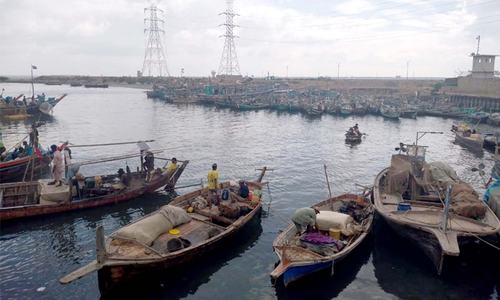KARACHI: While the recent formation of two subsequent cyclones — one in the Bay of Bengal and the other in the Arabian Sea — generated a lot of public interest, a few people know why one was named ‘Gulab’ and the other ‘Shaheen’.
In fact, the word ‘Gulab’ was received so well in the general public, apparently due to its poetic connection, that many in the media are not ready to stop using this word for the newly developed cyclone ‘Shaheen’ currently existing over Balochistan’s waters.
“I am tired of telling journalists the difference between the two. I think it’s not just lack of awareness and our familiarity with word Gulab, people continue to use this word because cyclone Shaheen developed out of Gulab’s remnants,” city weatherman Sardar Sarfaraz said, adding that the fact that Pakistan proposed the name ‘Gulab’ might also made it popular.
Mr Sarfarz explained that a weather system passed through four stages before it matured into a cyclone; the system first developed into a low pressure area, then a well-marked low pressure area followed by depression and deep depression before a cyclone was born and named.
Gulab was named by Pakistan, Shaheen by Qatar
According to experts, the World Meteorological Organisation (WMO) in 2000 agreed to start assigning names for cyclones over the north Indian Ocean basin using a list of names suggested by the countries surrounding the ocean basin.
After four years of continuous deliberations, the India Meteorological Department (IMD) initiated the naming of the north Indian Ocean storm with Cyclone Onil in September 2004.
There are six Regional Specialised Meteorological Centres (RSMCs) and five regional Tropical Cyclone Warning Centres (TCWCs) across the globe. They monitor cyclogenesis, issue advisories and name cyclones.
The RSMC in New Delhi is one among them that provide advisories to 13 countries — Bangladesh, India, Iran, Maldives, Myanmar, Oman, Pakistan, Qatar, Saudi Arabia, Sri Lanka, Thailand, United Arab Emirates and Yemen — in the north Indian Ocean basin.
RSMC, New Delhi is responsible for naming cyclones over the Bay of Bengal and the Arabian Sea based on the suggested names from all these countries, part of WMO body for north Indian Ocean/Arabian Sea.
“The first list with 64 names was prepared in 2004 as per the WMO guidelines by eight member countries. Some of the important criteria for naming cyclones include that the names should be politically and culturally neutral, should be short and easy to pronounce and remember,” said Mr Sarfaraz, adding last year, the Gulf countries also joined the WMO body.
In May 2020, Cyclone Amphan became the last cyclone to get its name from this old list. In 2020, a new list of cyclone names was issued by IMD, following WMO guidelines.
After Amphan, the naming started with the first list — Nisarga, Gati and so on. After 13 cyclones, when List 1 is fully used, the naming resumes from List 2 and so on. Cyclone Shaheen proposed by Qatar is the 8th name to be used from the new list. Next is Saudi Arabia’s turn which has proposed ‘Jawad’ as the cyclone’s name.
Published in Dawn, October 2nd, 2021















































